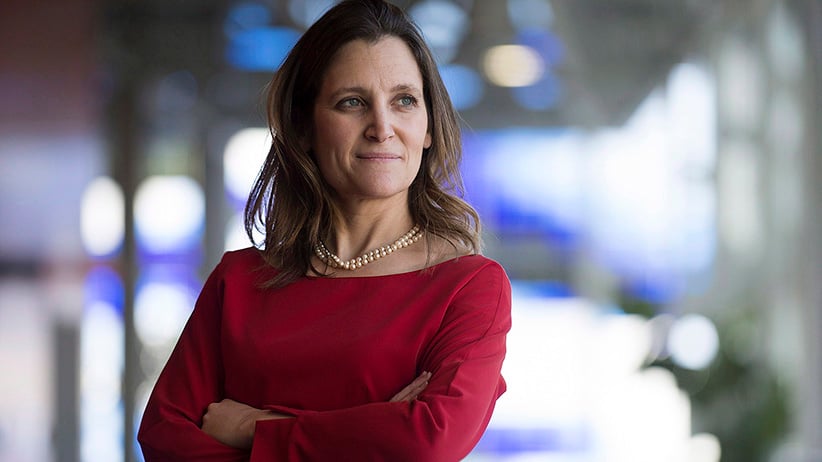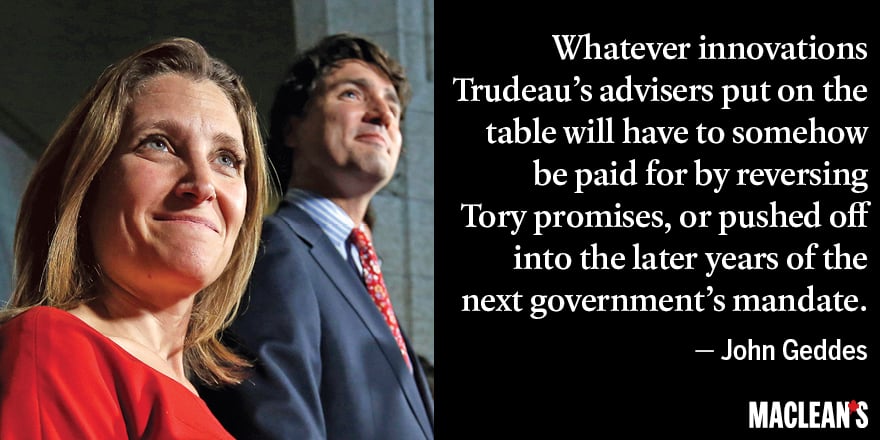The inner circle: Inside Trudeau’s economic advisory team
Justin Trudeau has gathered his economic policy gurus. Next up: an actual platform.
Federal Liberal MP Chrystia Freeland poses for a photograph on day three of the party’s biennial convention in Montreal, Saturday, February 22, 2014. Graham Hughes/CP
Share

Every few weeks through much of 2014, Liberal Leader Justin Trudeau met on Parliament Hill with an eclectic group of business executives, university professors and think-tank policy wonks, along with a few of his own MPs. They would hash out economic issues—everything from income inequality to energy and the environment—for two hours or more. It was the sort of discussion of weighty matters that political image-makers are usually eager to draw attention to, often by issuing stilted photographs of their leader, brow furrowed, keeping serious company.
But the Liberals didn’t get around to formally announcing the roster of Trudeau’s economic council of advisers until almost the end of 2014—about eight months after its first meeting. Far from trying to attract maximum attention to it, they seemed to want to leave the council largely unnoticed. “What was important for us was for this group to have met a few times, to have done substantive work, before we started talking too much about it,” says Toronto MP Chrystia Freeland, who co-chairs the council with Nova Scotia MP Scott Brison. “We wanted this not to be about press releases.”
The suspicion in Ottawa whenever a politician assembles a blue-chip panel is that deep thinkers are window dressing, while the real decisions will be made by the usual partisan operatives. Assessing the influence of Trudeau’s group will have to wait until the Liberals’ 2015 election platform is unveiled. Still, members of the council say they sense real potential. “The discussions are very in-depth and tend to get into the weeds a great deal. It’s not just blue-skying from 40,000 feet,” says council member Mike Moffatt, a professor at Western University’s Ivey Business School (who also blogs on economic issues for Maclean’s).
Moffatt is among the academic specialists who, typically, lead off the council’s meetings by framing research on a hot topic. He’s a trade expert who also focuses on the economy of southwestern Ontario, likely a key 2015 election battleground. Another is University of Ottawa economist Miles Corak, an expert on “intergenerational mobility”—the chances of a kid earning more or less than his or her parents did. Corak worries about income inequality growing more entrenched in Canada. Kevin Milligan, who teaches at the University of British Columbia’s Vancouver School of Economics, was a sharp critic of a major tax-cut package Prime Minister Stephen Harper announced last fall, arguing it was the wrong time for relief largely benefiting high-income families.
Given Trudeau’s emphasis on middle-class income stagnation, it’s no surprise he’s turning to professors such as Corak and Milligan (another Maclean’s contributor) for ideas. Perhaps more intriguing are some of his council’s private sector members. George Gosbee, chief executive of Calgary-based AltaCorp Capital Inc.—who, previously, served on the economic advisory council of Jim Flaherty, Harper’s finance minister from 2006 until shortly before his death last spring—brings to the table an Albertan business perspective not often associated with the federal Liberals. “It was important for us that this be a truly national group, and so essential to have people who understood and were significant voices in the West,” Freeland says.
The biggest corner-office name on the list is also a senior Liberal partisan: Frank McKenna, currently deputy chair of TD Bank Group, and formerly the Liberal premier of New Brunswick, as well as Canada’s ambassador to the U.S. There’s also Bill Morneau, the former head of a Toronto-based human resources services and consulting company, who is nominated to run for the Liberals in a downtown Toronto riding in the fall election. Morneau stepped down as chair of the business-oriented C.D. Howe Institute last winter, after raising eyebrows by delivering a speech at a Liberal convention in Montreal, in which he accused Stephen Harper’s government of “partisan politics of the very worst kind.”
At the advisory council’s meetings, Morneau says strictly partisan considerations aren’t up for discussion. “Trudeau has very explicitly said to the council that this is not a place where we’re talking about how to politically get things done; this is a place where we’re trying to figure out what’s the right thing to do,” he says, adding, “That’s not to say there isn’t another table someplace where they’re talking about the political issues.” Freeland says Trudeau goes further than just asking the council not to talk about how to sell ideas to the voters; he actually reins them in when they veer from policy to politics. “Occasionally, we’ll get into a political discussion,” she says, “and he’ll say, ‘Look, I’m going to take care of the politics; these meetings are about what is the best thing to do.’ ”

Even if the council isn’t being asked to consider how to package their prescriptions for the coming campaign, Liberals have to worry about eventually selling an economic message. Harper sees economic policy as his turf. Although he has worked most of his adult life as a politician, political aide and lobbyist, Harper has an master’s degree in economics from the University of Calgary—a credential Tories like to highlight, especially when they’re also mentioning Trudeau’s pre-politics career as a teacher.
Harper spent much of last fall making life miserable for opponents seeking to craft economic policy that would put him at a disadvantage during a campaign. He was saddled with his own 2011 campaign pledge to let couples with kids split their incomes for tax purposes, a promise widely criticized, even by Flaherty, for favouring mainly well-off families. In the fall, Harper combined a modified version of income-splitting with an expansion of the Universal Child Care Benefit. That didn’t silence critics—including Milligan—but it spread the benefits of the Tories’ family-tax policy more widely, making it much more defensible. Trudeau still vows to reverse the policy if he’s elected, arguing that about half the benefits of Harper’s package will go to Canadians earning more than $100,000, and that the measure will “eat through virtually the entire federal surplus.”
Trudeau issued that comment in early November, before Harper made his latest big move on infrastructure. The Liberal leader had been signalling for months that infrastructure spending would be a key Liberal priority. Then, on Nov. 24, Harper announced a whopping $5.8 billion in new infrastructure spending of his own. Unlike some previous programs, in which Ottawa had to partner with cities and provinces, this one would target mainly federal facilities. The Prime Minister promised construction of airports, harbours, shipbuilding yards, laboratories, military and RCMP facilities. Since these projects don’t require participation from lower levels of government, they can be under way, in many cases, by next fall’s campaign.
The combination of billions in tax cuts and billions more in infrastructure outlays went a long way to erasing the surplus expected to reappear on federal balance sheets this year. But there was more to come, as plummeting oil prices forced forecasters to slash their projections for federal revenues. This week, TD Economics said the Canadian government will have to dip into its $3-billion contingency reserves just to post slim surpluses in 2015-16 and 2016-17. That leaves no margin for significant new spending in this year’s budget, and possibly not in next year’s, either.
The long-assumed context for an election—a competition among the parties for who could persuade voters they have the best plan for spending fat surpluses—is now shattered. Whatever innovations Trudeau’s advisers put on the table will have to somehow be paid for by reversing Tory promises, or pushed off into the later years of the next government’s mandate.
Figuring out who benefits politically by a more unsettled economy is far from straightforward. Pollster David Coletto, of the Ottawa firm Abacus Data, says voters tend to punish a ruling party only if they blame it for bad economic times. If they are merely anxious about the economic outlook, Coletto says, they often stick with the incumbent, out of a sense of caution.
Coletto says Conservatives don’t really enjoy the brand edge they often claim to have on basic economic competence. Asked last year how each of the three main federal parties would manage the economy, 27 per cent of Canadians polled by Abacus rated Harper and the Conservatives as good or excellent, tied with Trudeau and the Liberals, with Mulcair a bit behind, at 23 per cent. But Coletto says voters won’t really focus on Trudeau until a campaign begins—and that’s when he will be tested. “There are still some lingering questions about his competence that will come to head when the campaign begins, especially if oil prices remain low and Canadians are uncertain if the economy has turned the corner.”
By then, Trudeau’s team will have had plenty of time to figure out if the ideas his economic advisers have been debating with him in private can be sold to the voting public. He’s asked them to keep policy separate from politics. In an election year, however, what matters most is how he finally brings them together.